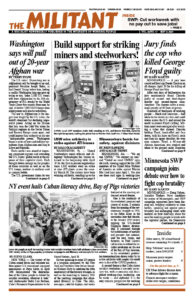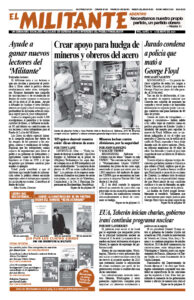Unable to stop the nationwide movement against the Feb. 1 military coup, despite killing more than 700 people and jailing thousands, the military regime continues to step up targeting of union and other protest leaders.
Soldiers and police arrested Myo Myo Aye, director of the Solidarity Trade Union of Myanmar, April 15 at the union’s office in Shwepyithar Township, a working-class neighborhood of Yangon. “We lost our pillar,” said a member of the union staff, “but we are going to operate with the remaining staff.” The STUM is one of many unions that have been at the forefront of protests against the regime.
That same day an unmarked car deliberately crashed into a motorbike protest action in the town of Monywa, hitting Ko Wai Moe Naing, a leader of the Sagaing Regional Youth Committee. Armed thugs jumped out of the car, then beat and hauled him off to army headquarters.
“We simply don’t want to go back to the dark age” of military rule, the 25-year-old Muslim youth committee leader, in predominantly Buddhist Myanmar, told Irrawaddy before he was seized. Friends worry that he will be tortured. Well-known actor Zin Wine and singer Po Po, who have spoken out against military rule, were also arrested April 15.
The military has a list of 930 more people it is looking for in connection with the protests. Among them are actors, singers and others wanted on charges of encouraging dissent in the armed forces. The junta is seriously concerned about the reliability of the largely working-class rank and file of the military.
Soldiers attack march of striking medical workers
In Mandalay, the country’s second largest city, soldiers attacked a march of striking doctors and other medical workers April 15, arresting 16 people.
Later that day junta forces fired into the Sule Mosque in Maha Aung Myay Township south of Mandalay, where strike organizers were spending the night, killing one and arresting five others, including children. Soldiers also set fire to houses in a nearby Muslim neighborhood, burning down at least 40 homes.
The junta’s repression is bringing together working people from different religions and ethnic groups. Nuns from the Order of Saint Joseph of the Apparition and a group of Buddhist monks brought food and donations to victims of the fire.
The regime’s repressive forces opened fire on residents and looted public donations for striking railway workers kept at a monastery in the small town of Myitnge, a rail center in Mandalay Region, April 11. Three people were killed and about a dozen wounded.
“Many of our members still refuse to go back to work,” Maung Maung, president of the Confederation of Trade Unions Myanmar, told a mid-April webinar conference. He pointed to workers on strike on the railway, and at the oil and gas company, banks, schools and hospitals, who are opposing the military coup.
The Assistance Association for Political Prisoners said April 18 that the death toll at the hands of the regime has reached 737. Another 3,229 have been arrested.
The junta, led by Gen. Min Aung Hlaing, seized power after the National League for Democracy, a capitalist party led by Aung San Suu Kyi, won the November elections in a landslide. Suu Kyi had shared power with the military command since the party first won in the 2015 elections. Under the 2008 constitution the military high command automatically controls key ministries and 25% of the seats in parliament.
Over a third of Myanmar’s population is made up of 135 ethnic minorities recognized by the government, as well as the Rohingya, who the government falsely claims are “illegal immigrants.”
Members of the majority in the shuttered parliament announced April 16 that they had formed a “National Unity Government.” They named Suu Kyi, who is in prison and denied any communication with her supporters, as head of state. They also named leaders of some of the main ethnic minorities to symbolic ministries.
Even before the coup 70% of the population lived in the countryside where most homes don’t have electricity, cooking gas or indoor plumbing. A fourth of the nation’s children are small for their age because of inadequate nutrition. Some 8 million people eke out a living on less than $3.20 a day.
Protest organizers called on people to boycott the annual three-day Thingyan water festival that usually attracts thousands across the country. Instead, in Mandalay thousands turned the festival into a protest, marching with the traditional flower pot, but stamped with the symbols of the civil disobedience movement.
“This year we will mark Thingyan only with revolutionary chants,” poet and Mandalay resident Kyaw Gyi told Myanmar Now at the march.
The regime’s newspaper, The Global New Light of Myanmar, tried to counter the boycott, by claiming that Ngapali beach was “thronged” with travelers celebrating the holiday. But the picture they ran with the article showed an almost empty beach.

